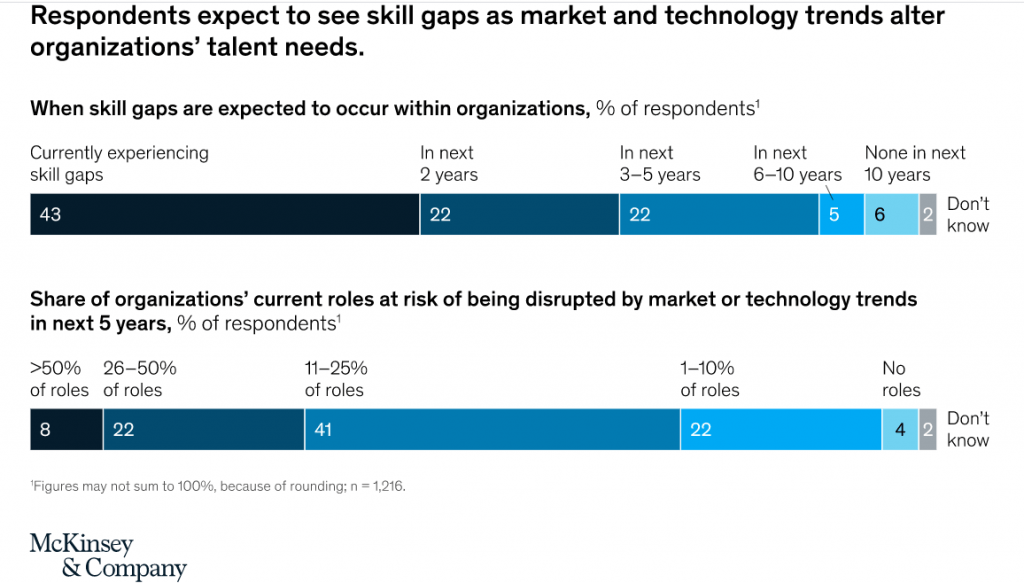The COVID-19 pandemic has led to businesses around the world facing unprecedented amounts of disruption and change. That is why most organizations are currently being compelled to rethink and reinvent working for the long haul. Even in the pre-pandemic era, businesses were having to battle with talent shortages across multiple verticals due to disruptions that were caused by digitization and the gradual adoption of intelligent technologies.
In 2017, the McKinsey Global Institute estimated that close to 60% of occupations had at least 30% of constituent work activities that could easily be automated by 2030. It implies that close to 375 million workers globally would be needing to switch occupations or acquire new skills by 2030.
The pressure of reskilling was building up quite slowly on organizations when the pandemic broke out suddenly and forced workers across various industries to figure out how they can adapt to the rapidly changing conditions. Companies also had to learn how to quickly they can upgrade their workers for new roles and activities in order to adjust to the new normal of ‘remote work ecosystem’.
Reskilling has currently emerged as a critical response not just to recover from the Coronavirus crisis but to prepare for the ‘future of work’ as well. As a result, reskilling or upskilling programs have hugely transitioned from an ‘optional’ to a ‘mandatory’ action item for all major companies in thier corporate agenda.
It should also be noted that many global organizations had already committed to reskilling their employees and workers before this COVID-19 situation hit. For instance, in July 2019, Amazon Inc, to retrain 100,000 employees for higher-skilled jobs in technology, happened to pledge a whopping $700 million. Similarly, in March 2019, JPMorgan Chase put together a five-year plan and committed $350 million globally to develop high-in-demand technical skills in their workforce.
Even though companies are trying their best to reskill their workers quickly, the recent McKinsey findings have shown that 87% of executives believe they are experiencing skill gaps in the workforce or expected them within a few years. On the flip side, only 28% of executives believe that their organizations are making active decisions on closing the skill gap.

The COVID-19 Crisis: A Cause Of Rapid Paradigm Shift In The Business Landscape
To quickly adapt to the COVID-19 crisis, besides emphasizing training workers for new skills, products, systems, and processes, organizations are also focusing on non-technical skill training. These include effective communication, employee engagement, and other soft skills. Even the top leaders, such as business and process heads, also have to undergo various learning and development programs because of this crisis.
McKinsey’s latest research has shown that smaller organizations, due to employing agile principles, are currently being more successful at reskilling their workforces. Also, most organizations that have launched reskilling programs claim that they feel quite ready to address skills gaps caused by future disruptions. Interestingly, the organizations that viewed their reskilling programs as unsuccessful also feel better prepared to take on future skills gaps.
The Emergence Of Reskilling In the Current Scenario
Irrespective of the geographical location, the size or type of organization, the function of the upgrading or acquiring new knowledge has evolved from being an optional requirement into an indispensable one.
According to LinkedIn’s Workforce Confidence Index 2020 in India, close to 64% of working professionals across various industry verticals reported that they are very likely to increase their focus on learning in the coming weeks. Also, 3 out of 5 working professionals claimed that they strictly believe that they will achieve career progression through upskilling.
As remote work and video conferencing are being increasingly adopted as part of long-term workforce planning, managers and leaders of various organizations will need to upskill themselves to engage, motivate, and manage distributed teams.
Developing employee engagement and employer branding in a remote working environment is essential as it offers a massive boost to productivity. To maintain resilience for the future in terms of disruption due to lack of skills, organizations should focus on training, paired with transparent communication and employee incentives.
Challenges Faced In Upskilling Workforce
When it comes to organizations upskilling their workforce, one must consider a few vital and critical perspectives. First, it is essential to adopt platforms that are backed by new-age technology instead of implementing traditional methodologies.
Secondly, the workforce usually needs some time before getting used to fully digitized approaches to reskilling, such as self-paced and self-training programs. They also need to be extremely receptive when it comes to upgrading their skills to be optimally prepared for possible expansion in their job roles in the future. At the same time, the organization or companies need to effectively adapt themselves to the virtual medium so that they can engage, coach, and support remote teams very quickly. It should be noted here that the reskilling programs’ facilitators should not merely keep track of the productivity and learning curves but also provide emotional support to the workforce, which is essential to cope up in a rapidly changing business environment.
Lastly, many large scale or global companies have reported having problems identifying the existing skillsets in their employees while designing their reskilling programs. Thus it becomes challenging for them to understand how to bridge the skill-gap effectively. Also, low bandwidth, power fluctuations, and other technology-related issues tend to hinder the seamless delivery of upskilling training programs.

